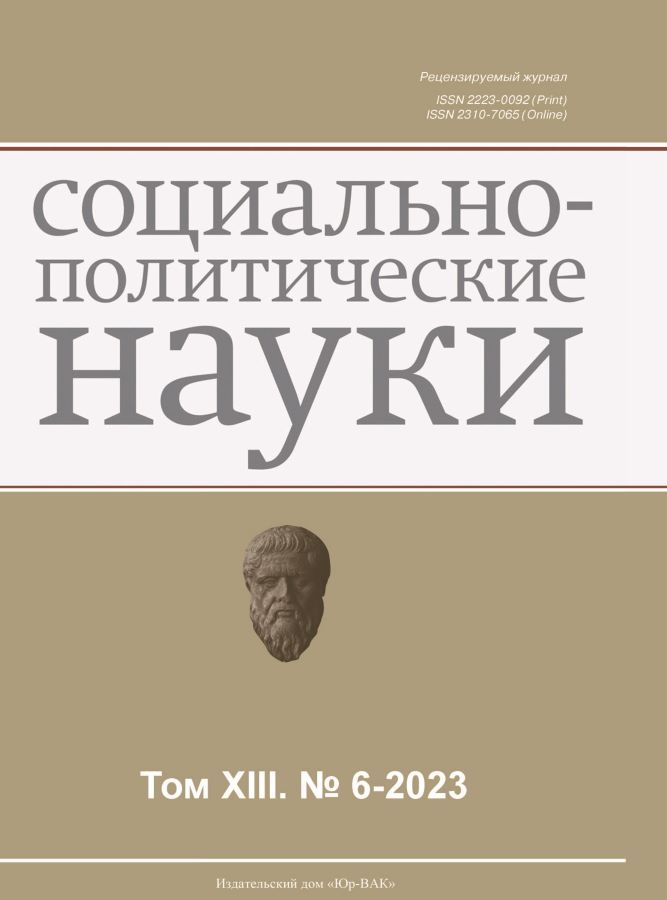Preferences of Users of Video Services: Results of a Sociological Study of the Reasons for Watching Videos “Without Plot or Content”
- Autores: Garaganov A.V.1, Razov P.V.1
-
Afiliações:
- Financial University under the Government of the Russian Federation
- Edição: Volume 13, Nº 6 (2023)
- Páginas: 154-159
- Seção: Sociology of management
- URL: https://journals.eco-vector.com/2223-0092/article/view/626929
- DOI: https://doi.org/10.33693/2223-0092-2023-13-6-154-159
- EDN: https://elibrary.ru/BXECXR
- ID: 626929
Citar
Texto integral
Resumo
The article presents empirical results of studying the preferences of video service users, as well as the reasons for millions of video views “without plot and content”. The relevance of the studied problem from the point of view of media content consumption in the daily life of the active part of the population of the Russian Federation is substantiated. The most typical reactions of respondents were studied, the motives and social significance of this phenomenon were analyzed. The article presents the main dominants of the evaluative attitude among the respondents to the viewed content. The results of the study led to the conclusion that video services have become an important source of media and information flow that meets the information needs of young people.
Palavras-chave
Texto integral
Sobre autores
Artur Garaganov
Financial University under the Government of the Russian Federation
Autor responsável pela correspondência
Email: arturcompany21@gmail.com
researcher, Center “Locomotives of Growth”, Department of Sociology
Rússia, MoscowPavel Razov
Financial University under the Government of the Russian Federation
Email: pvrazov@fa.ru
ORCID ID: 0000-0003-2714-8622
Código SPIN: 9488-2829
Dr. Sci. (Sociol.), Professor, Professor Department of Sociology, Faculty of Social Sciences and Mass Communications
Rússia, MoscowBibliografia
- Analytical review by VTsIOM “Social networks and messengers: involvement and preferences”. URL: https://wciom.ru/analytical-reviews/analiticheskii-obzor/socialnye-seti-i-messendzhery-vovlechennost-i-predpochtenija (data of accesses: 22.11.2023).
- Rudenkin D.V. How and why Russian youth use the YouTube service: Experience of sociological analysis. In: Culture, science, education: Problems and prospects: Materials of the IX International Scientific and Practical Conference (Nizhnevartovsk, November 10, 2021). D.A. Pogonyshev (rep. ed.). Nizhnevartovsk: Nizhnevartovsk State University, 2021. Pp. 163–170. (In Rus.) doi: 10.36906/KSP-2021/23. EDN: ZIPJBW.
- Garaganov A.V. Trust in digital media: challenges and prospects. Regional Aspects of Management, Economics and Law of the North-Western Federal District of Russia. 2023. No. 3 (59). Pp. 37–42. (In Rus.). doi: 10.51623/26868183_59.2. EDN: ZGOIKO.
- Garaganov A.V. Sociology. Psychology. Pedagogy: Collection of scientific works. In 3 vols. Vol. 3. St. Petersburg: LLC “SRC ART”, 2023. 102 p. ISBN: 978-5-00231-015-9. doi: 10.51623/00231-015.23. EDN: KQYRSR.
- Razov P.V., Garaganov A.V. Digitalization of the media as a factor influencing trust in artificial intelligence. Digital Sociology. 2022. Vol. 5. No. 4. Pp. 90–97. (In Rus.) doi: 10.26425/2658-347X-2022-5-4-90-97. EDN: ZEWUIG.
- Razov P.V. ESG: Progress in research and prospects for the future. Socio-political Sciences. 2022. Vol. 12. No. 2. Pp. 60–66. (In Rus.) doi: 10.33693/2223-0092-2022-12-2-60-66. EDN: VIPJCE.
- Kuznetsova K.M. Reasons for the popularity of YouTube from the point of view of knowledge about generations. Social and Human Sciences: Theory and Practice. 2019. No. 1 (3). Pp. 434–446. (In Rus.)
- Saiganova E.V., Lepneva A.M., Zholudeva A.A. Video blogging as a new space for self-realization of young people. Current Problems of the Humanities and Socio-economic Sciences. 2020. No. 3 (74). Pp. 95–97. (In Rus.)
- Temnova L.V., Lapshina A.K. Dynamics of video preferences of Russian youth (using the example of YouTube video hosting). Bulletin of the Russian Peoples’ Friendship University. Series: Sociology. 2021. Vol. 21. No. 1. Pp. 110–123. (In Rus.)
- Garaganov A.V. YOUTH NEEDS. Generations: Millennials, zoomers, alphas: Monograph, scientific research. P.V. Razov, Z.G. Khanova (sci. revs.). Moscow: Publishing solutions Under license from Ridero, 2022. 230 p. (Scientific research). ISBN: 978-5-0056-4645-3. EDN: AGLEHS.
Arquivos suplementares









